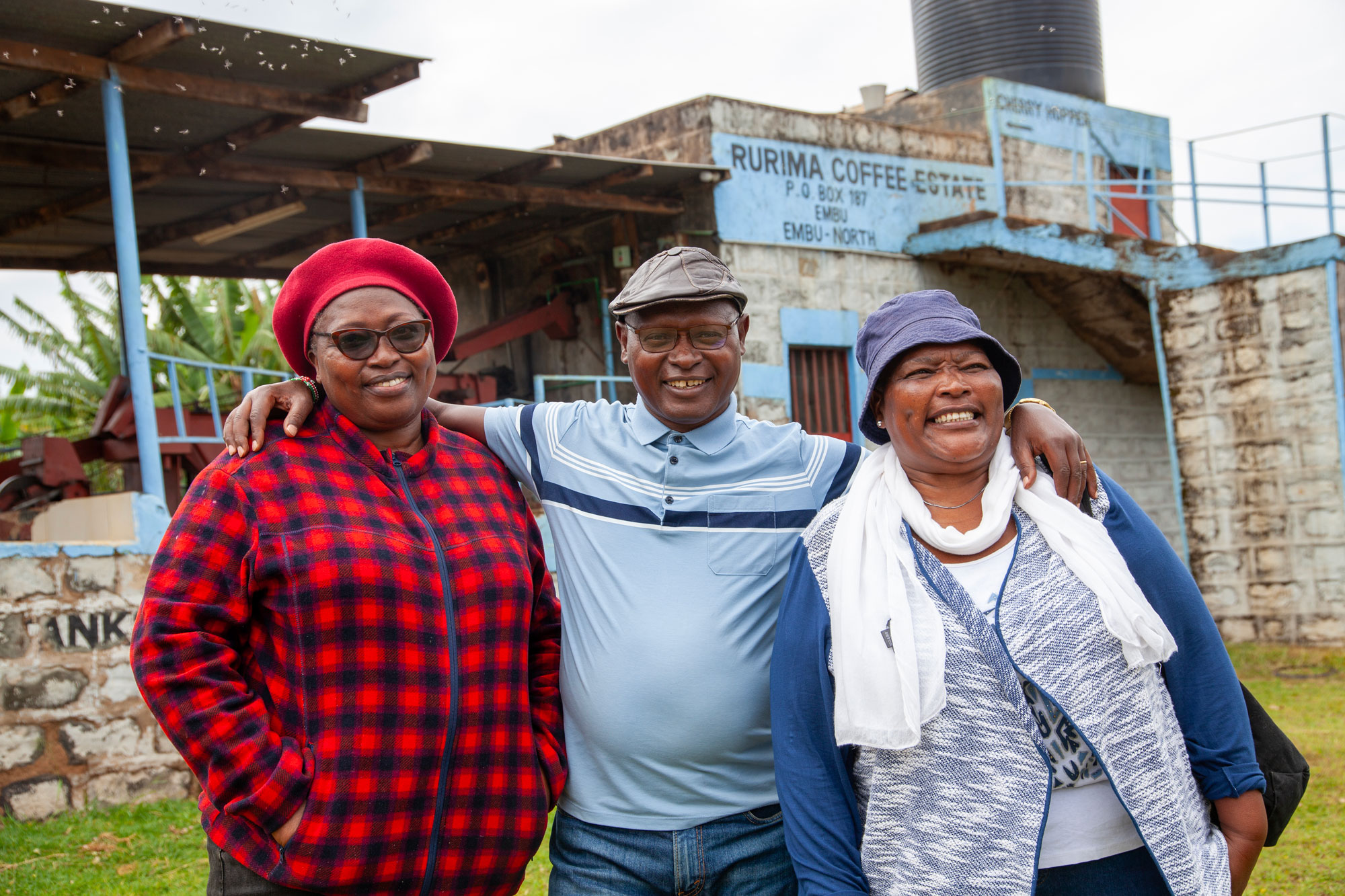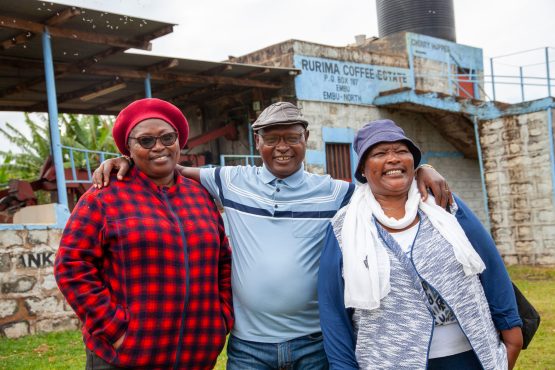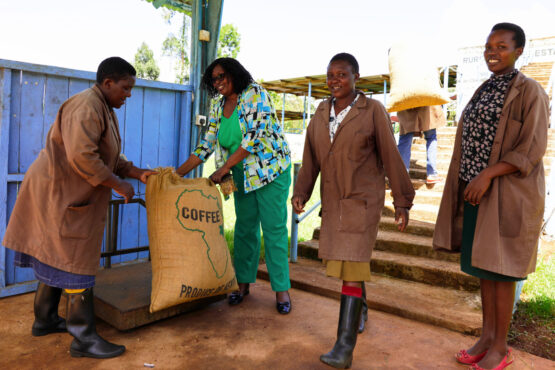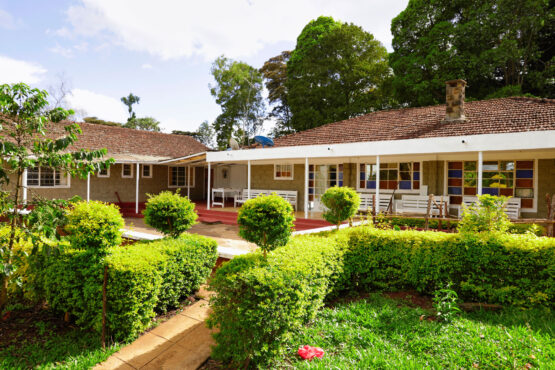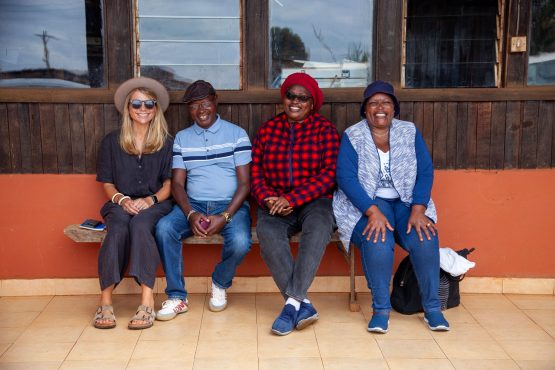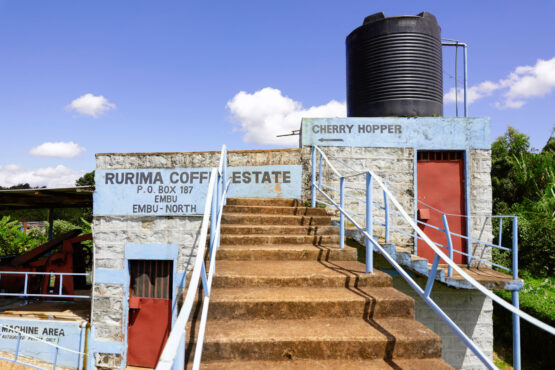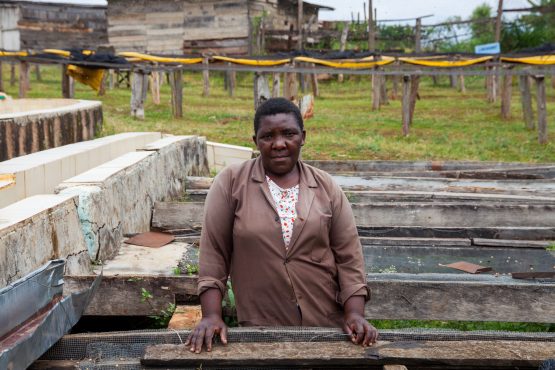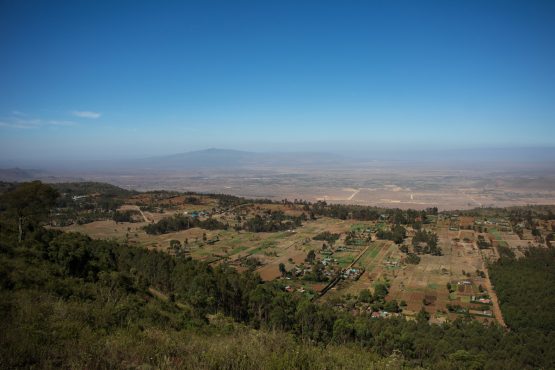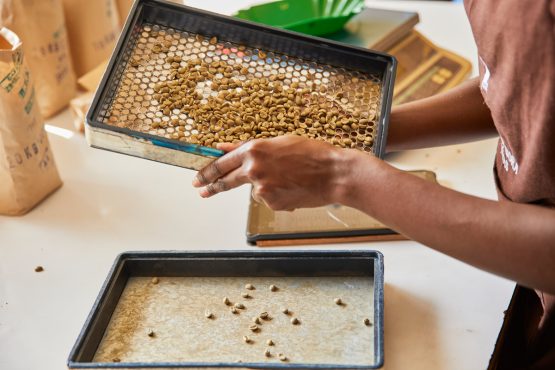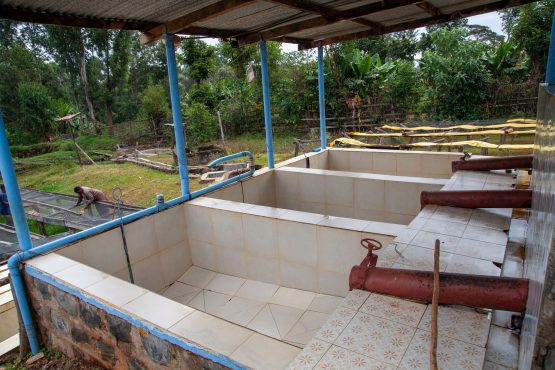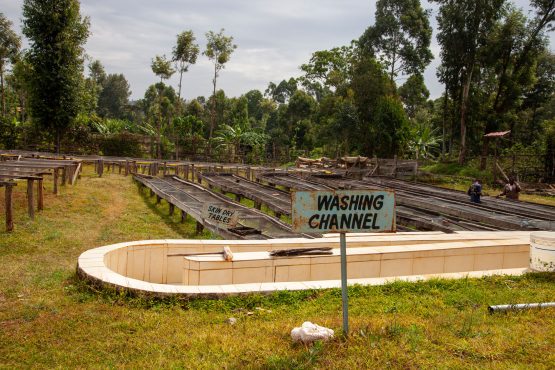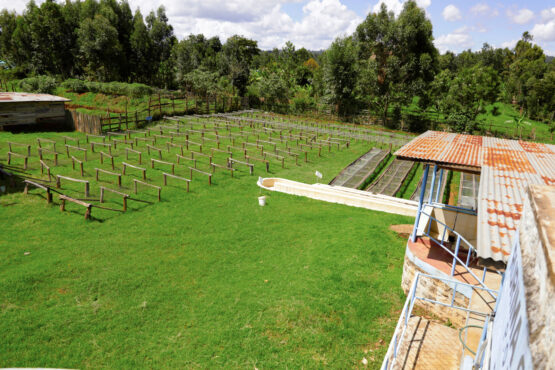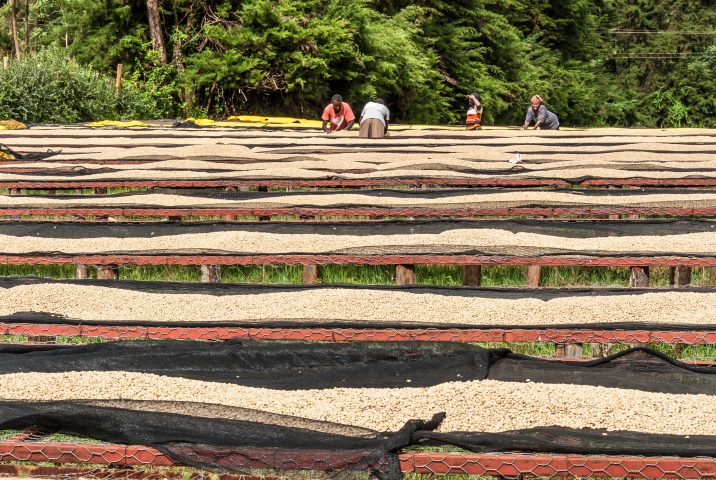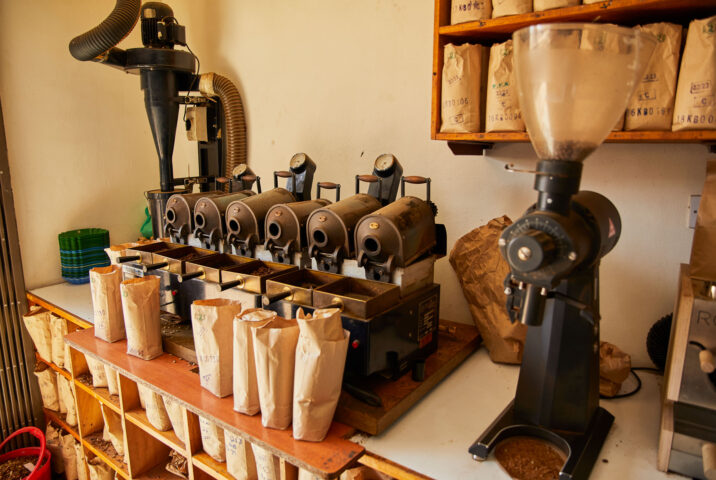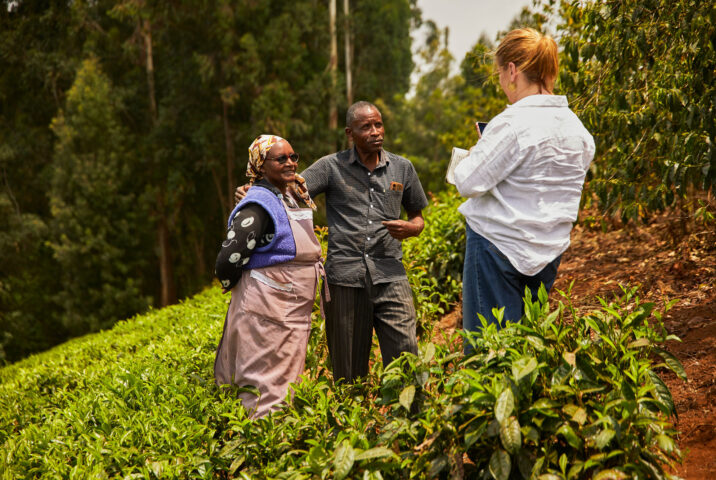Rurima Estate AA
Rich and sweet, with great balance. Pink Lady apple and cherry cola, with milk chocolate on the finish.
Rurima is a family-owned and operated 15-hectare coffee farm and wet mill (or factory, as they are known in Kenya), located in Embu County. The factory is shared by a family cooperative made up of 8 immediate siblings and a number of siblings-in-law and first cousins, totalling about 20 members. Each member of the cooperative owns and manages their own shamba (Swahili for farm), where they independently grow and harvest their coffee crops. To guarantee streamlined operations, Rurima is overseen by a management committee of five siblings, led by Lucy Wanja Ndogo and incuding her sister and brothers, Pamela Muthoni, Jim Muturi, Morton Ndwiga and Patrick Njue.
The property sits between 1,720-1,800 meters above sea level in Embu County, in the foothills of the extinct volcano, Mt Kenya, close to the town of Manyatta and the Kapingazi river. The area is defined by its bright red, nutrient-rich, volcanic soil and a cool climate, both of which contribute to the outstanding quality of the coffees produced in the region.
The estate was initially purchased by the family’s patriarch — a timber merchant who expanded his love for farming into coffee production — in 2008, after he relocated to Embu from Mbeere County (formerly part of Kenya’s Eastern Province). Some parts of the estate were already planted with coffee, which were progressively increased to around 15 hectares. Besides planting coffee trees, Lucy’s father set up a timber mill on the property and built the site’s coffee-processing infrastructure (also in 2008), utilising lessons he learned through the establishment and operation of a mill he had previously built in Mbeere District, in the 1980s. He named the new estate for his own father, Rurima.
Since Lucy’s father’s passing, Rurima’s coffee producing land has been parcelled into 12 individual shambas and bequeathed to various extended family member, including Lucy and her immediate family. The estate runs like a cooperative: The siblings farm their plots independently, delivering their fresh cherry to Rurima factory during the harvest. Records are carefully kept, to ensure earnings from the sale of the processed coffee are distributed fairly. The coffees are lotted after drying, and delivered as a single outturn to the dry mill.
Having their own factory enables the family members to process and dry their own crop, rather than selling into the cooperative system. This allows the siblings to control every step of their production directly – from farming, to harvesting, processing, drying and sale – to ensure the full potential of the crop is achieved in terms of quality and sale price. Day to day operations are overseen by Purity Muthoni, who has been employed by the family since 2017. Purity is supported by Godfrey Gicovi, the Processing Supervisor, who advises the family on the best farming and processing practices to follow, based on unique considerations of each season.
Choosing to process their coffee independently is not easy — or cheap. Managing processing on such a small scale has required significant investment in infrastructure, equipment and staff. It is also far costlier to mill and market small volume lots than large day lots. This investment has paid off, however, as Rurima is now produces some exceptionally high-quality lots which can fetch higher prices at the point of sale.
Since the Kenyan government’s 2023 reforms, we have been sourcing coffee from Rurima directly, with the help of Wycliffe Murwayi as the marketing agent. To secure direct sales, Lucy has opened a USD account and is now responsible for producing the required documentation for export. The benefits of the direct model are higher profits, as the buyer (in this case, MCM) must offer competitive pricing to secure the coffee, and a faster turnaround time between the sale and the grower receiving their payments. Direct sales also support a more meaningful and values-led relationship between the growers and their buyers and have become more widespread as the coffee sector adapts to the reforms.
ABOUT EMBU
Embu County is part of Kenya’s former Eastern Province, which was dissolved in 2013. Embu borders Kirinyaga to the west, along with the country’s central coffee-growing regions. Embu is the traditional home of the Embu, Kamba and Mbeere people. This region and its surrounds are considered to be some the wealthiest areas of the country, due to the incredibly fertile land, geographical proximity to the capital, Nairobi, and close integration with the country’s colonial administration before Kenya gained independence in 1962. This integration afforded the communities who lived here with opportunities for education, business and political prowess, despite the various injustices of the colonial government. The Embu, Kamba and Mbeere people have a long and proud history of agriculture and cattle-raising, and the region is farmed intensively, with coffee, tea and dairy being the most important modern crops.
Like Lucy, many of the producers in the region are second-generation landholders, whose parents purchased and planted the land in the 1950s and 1960s, after agricultural reform allowed for small Kenyan farmers to produce cash crops on their family farms (instead of only on large, British owned estates). Farmers in Embu grow coffee as a cash crop alongside food crops like banana, maize, macadamia, avocados and vegetables. Tea and dairy are also important sources of income for the producers.
GRADING
Kenya uses a grading system for all its exportable coffee lots. The grading system is based on the size and assumed quality of the bean. A coffee’s grade is directly correlated with the price it attracts at auction or through direct trade.
This coffee is graded as an AA. This grade relates to the size (in this case, AA means that the beans are screen size 18 and above). More AA grade coffee is found in Central Kenya than anywhere else in the country, thanks to the high elevations which allow for greater late yields. These later yield cherries have the benefit of better weather, with optimum sunshine and a longer period for the sugars to develop and when they are finally picked, they are typically fuller, redder and heavier than cherries grown in other areas.
HOW THIS LOT WAS PROCESSED
The coffee was carefully handpicked by Lucy’s family members, along with any seasonal workers required. During the peak of the harvest, cherries are carefully picked, to ensure only the ripest are selected. After sorting, cherry was pulped using a pulping machine, which removes the skin and fruit from the inner parchment layer that protects the green coffee bean.
The coffee was then dry fermented for 12-24 hours, to break down the sugars and remove the mucilage (sticky fruit covering) from the outside of the beans. Whilst the coffee was fermenting it was checked frequently, and when ready it was rinsed and removed from the tanks.
Using clean water from the nearby Kapingazi river, the parchment-covered coffee was then washed and graded in water channels, before being transferred to raised drying tables. During the drying stage, which takes up to three weeks, the drying parchment was turned constantly to ensure it is dried evenly, until it reached 11–12% humidity. Once ready, coffee transported to the Embu County Mill to be dry milled and prepared for shipping.
WHAT’S IN A NAME?
Rurima means “hill or mountain,” and is the name of Lucy’s grandfather.
WHY WE LOVE IT
Coffees from Embu are recognised for their bright, juicy acidity and “classic” Kenyan flavours of blackcurrant and lime. We think this lot represents the best of Embu, with its sugary sweetness and notes of plum and cola. This is our first year of purchasing coffee from Rurima, a new relationship for MCM since Kenya’s 2023 coffee reform. You can read more about the reforms here, and how we are moving forward with our Kenyan sourcing program here.
